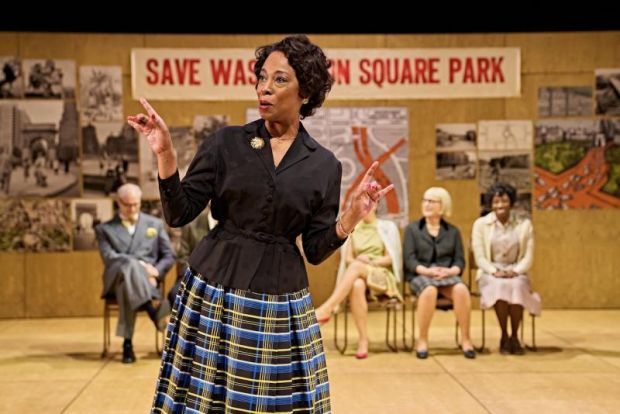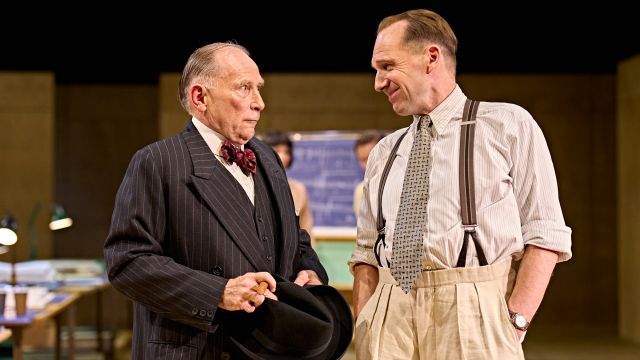Straight Line Crazy
Robert Moses, an unelected city planner, was for forty years the most powerful man in New York. In that time, he built parks, tunnels, bridges and over a thousand kilometres of freeways. He destroyed swathes of tenements – and thus their often black or other minority communities – and replaced them with ‘public housing’. In this way, he displaced up to two hundred and fifty thousand New Yorkers and revolutionised city planning in New York and across the US.
David Hare’s play seeks to dramatize the man and how and why he did what he did. In this, it appears he relies on Robert Caro’s mammoth revisionist biography The Power Broker. It’s an intricate, complex story of a complex man. Hare’s approach is to dramatises two key incidents: a victory and a defeat, both entirely set on Bob Crowley’s thrust stage.

In 1926, Moses (Ralph Fiennes) plans to build two freeways to Long Island, providing a link from the city to parks and beaches. But he needs the approval of rough diamond NY governor Al Smith (Danny Webb). It’s an arm wrestle between a cigar chomping, cussing, hooch drinking, immensely popular politician, and a smoothly bullying bureaucrat who is certain he is right.
This Act I tussle is the best section of the play because here Moses’ methods are dramatized. Here he has a real opponent rather than ‘I beg to differ, sir’ employees – Finnuala Connell (Siobhán Cullen) and Ariel Porter (Samuel Barnett). Fiennes is, of course, superb and Danny Webb matches him with irascible humour and seasoned, pragmatic wisdom. The politician must be elected and re-elected. Moses doesn’t have that problem. The reveal here is that Al Smith virtually orders Moses to include a train in the scheme. Moses does not. He does not approve of trains – that is, the people who ride on trains - and, when the bridges go ahead, they are too low for buses to pass beneath. The Long Island parks and beaches are for folks with cars… only. For Moses, the automobile is the future.

In Act II, in 1955, an older Moses in a rumpled, ill-fitting suit, diminished in popularity after having ‘cleared’ the Bronx, a largely black area then, now wants to drive a road through Washington Square Park – and destroy the Soho area. But times have changed – even if Moses hasn’t. For the first time there is organised black and white middle class resistance, led by architect and activist Jane Jacobs (Helen Schlesinger). Although Jacobs appears on stage, but mainly to narrate, she’s a device, not a character. Hare does not invent a confrontation between them. He confines himself to Moses’ sneering, sexist, racist comments about ‘handbag activists’. The only time the play moves away from Moses himself, it’s to see Jacobs and the activists. But the scene is there to demonstrate the cost of loyalty to Moses. He avoids the confrontation and sends Ariel and a reluctant young black architect Maria Heller (Alisha Baily) to argue for a scheme to which she is opposed.
Robert Moses was, as Marshall Berman points out in his study of modernity, All That Is Solid Melts Into Air, a clear example of the planner who – like Stalin - plans and builds almost for the sake of planning and building while telling himself and the world it is for the good of all. Not that it matters – Straight Line Crazy is a play, not a documentary – but Moses was much worse than Hare’s depiction of him. Ruthless, unethical, given to behind-the-scenes manipulations and financing. Hare diminishes him - perhaps in the attempt to humanise him. But apart from references to his love of solitary ocean swimming and concern for his alcoholic wife, ‘character’ mostly comes from Fiennes’ very detailed physical acting.

Most of the play otherwise is taken up with wordy and ill-disguised exposition as Moses explains to employees Finnuala and Ariel things they almost certainly know already. Not that this is without philosophical or political interest; there’s a Shavian quality to Moses’ dialogue: you recoil, then find yourself agreeing.
However, when a careworn Finnuala finally turns
antagonist, providing the play with a sort of climax, the effect is diminished by our wondering why it’s taken her thirty years to see she’s working for a monster. After all, he’s got older, but he hasn’t changed. The continuity between 1926 and 1955 is beautifully rendered in Fiennes’ performance.
(Moses, by the way, is depicted, as the meta-villain ‘Moses Randolph’, in the movie Motherless Brooklyn (Edward Norton 2019).)
The actors are the reason to see Straight Line Crazy; under Nicholas Hytner’s direction, they are terrific, giving it all they’ve got to power through a play in which, as drama, not much happens.
Michael Brindley
Photographer: Manuel Harlan
Subscribe to our E-Newsletter, buy our latest print edition or find a Performing Arts book at Book Nook.

